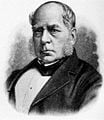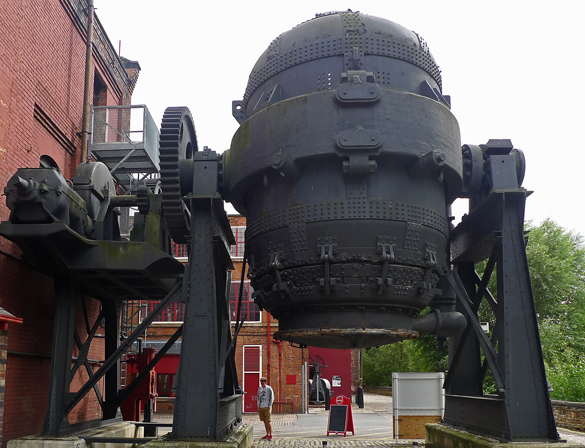Henry Bessemer wasn’t born in Yorkshire but his ingenuity can certainly be credited as one of, if not the most important factor in the development of modern day Sheffield where he built the systems that would propel the industrial revolution and literally transform the world.
Engineering development was being severely constrained in the early part of the nineteenth century by the limitations of cast iron and wrought iron. These materials were relatively weak and therefore prone to failure, with catastrophic consequences. Bessemer, a prolific inventor (granted 129 patents) patented the Bessemer steel making process. The process involved removing impurities in iron through the introduction of oxygen via air that was blown through molten pig iron. The refined metal was stronger than Iron, more resistant to rust and generally easier to work with. But the key to the success of the Bessemer process was that unlike any previous processes, the Bessemer process was cheap and made way for mass production. A number of companies licensed the technology but could not achieve good results. Subsequently Bessemer selected the ideal industrial location, Sheffield to build his concept and by doing so transformed not only Sheffield but the world. It is here that the story of Sheffield Steel began.
Bessemer perfected the process and inexpensive steel produced in huge volumes soon became the norm. Inexpensive, high quality steel ushered in a new age of progress in engineering that would enable mass transport with trains to carry people across continents and ships to make global trade. It unleashed the imagination of architects to build sky scrappers and laid the foundations for the modern economy.
Bessemer’s contribution to the development of the British economy, its science and engineering is beyond question today but was barely recognised by either the government or the wider population during his life time. That a man who did so much for industrial development did not receive higher recognition from his own government was a source of deep regret to English engineers. The same engineers alluded to the fact that in the United States, where the Bessemer process found much use, eight cities or towns bore his name. Towards the end of his life he was finally knighted for his contribution to science on 26 June 1879, and in the same year was made a fellow of the Royal Society. In 1895, three years before he died, he was elected a Foreign Honorary Member of the American Academy of Arts and Sciences.
The Steel making that remains in Sheffield is small by contrast to the past. Stocksbridge Special Steels, where Wilson Benesch Design Director, Craig Milnes was apprenticed is a notable example. Samuel Fox Steel works in Stocksbridge was established on the ingenuity of the Paragon Umbrella that was sold globally and was in fact the largest manufacturer in the world at the turn of the century. Stocksbridge went on to be recognised as one of the world finest manufacturers of very specialised steels for aerospace and advanced engineering. After nationalisation the Fox logo that had been used for decades as a mark of quality was shelved, only to be brought back when the global market declined as customers lost confidence in the quality of the steel where the Fox logo was absent. Stocksbridge was one of the first continuous casting facilities in Europe. Continuous casting was another invention that was patented by Bessemer.
Margret Thatchers desire to make Britain the first post industrial economy in the world impacted on Sheffield more than most other cities. Sheffield was de-industrialised as part of this experiment and during the 1980’s British Steel Corporation was sold.
Privatisation failed and unemployment and manufacturing decline followed, not only in the steel industry but the thousands of small supply companies that had thrived and grown over a hundred and fifty years. A good example of these supply companies was Greaves of Sheffield. Greaves grew out of the cutlery industries need for high quality wooden cutlery cases. As the steel and cutlery industry declined it expanded into other markets including the audio industry. Greaves became the main UK supplier of cabinets for audio companies including Bowers and Wilkins, Acoustic Energy, Linn and countless others. Without Greaves, it is highly unlikely that the first Wilson Benesch loudspeaker would have ever been built, for it was within the Greaves prototyping shop that the Wilson Benesch founders assembled the first prototypes. Craig Milnes witnessed the closure of the company and actually purchased equipment from the sale that is still in use by Wilson Benesch today.
The effects of industrial deconstruction was popularised by the very successful film “The Full Monty” that described a proud city that was once the engine room of the British economy, being transformed and left with shattered communities. The film homes in on a small number of unemployed steelworkers who gain employment by stripping naked in a working mans club.
Coming Full Circle, there is a new momentum in Sheffield manufacturing and advanced engineering, thanks to a large extent to the drive within small companies. The strong traditions have survived the ravages of political dogma and today small and large companies build upon the legacy of Bessemer and others like him. Sheffield’s engineering and materials science always maintained a global reputation with world class Universities, both of which are recognised specialists in materials science. The Advanced Manufacturing Park provides a just a glimpse of what the future holds. A Centre of Excellence with major research and development companies including Boeing and Rolls Royce. Castings International alongside specialist Carbon Fibre research facilities. More recently the Nuclear Advanced Manufacturing Research Centre, a collaboration between Sheffield University and Rolls Royce has been located here. Thousands of advanced engineering jobs are being created every year. Strongest among these? the small companies like Wilson Benesch, as documented within the report by the Sheffield City Council, Modern Manufacturing An Economic Asset for Sheffield and the City Region. The huge contribution that this sector makes to the UK economy is impressive. Looking to the near future, further growth is assured as Sheffield acquires, Enterprise Zone status.
Bessemer Converter
Sheffield’s Kelham Island Industrial Heritage Museum, maintains an early example of a Bessemer Converter for public viewing.



